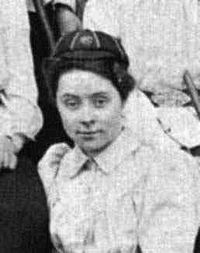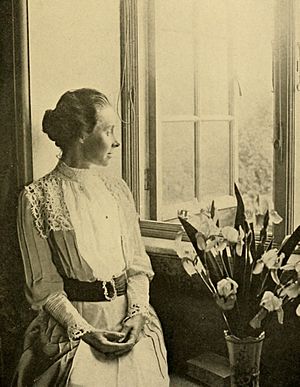Philippa Fawcett facts for kids
Quick facts for kids
Philippa Fawcett
|
|
|---|---|

Fawcett in 1891
|
|
| Born |
Philippa Garrett Fawcett
4 April 1868 Pimlico, England
|
| Died | 10 June 1948 (aged 80) |
| Nationality | British |
| Alma mater | Newnham College, Cambridge & Bedford College, London |
| Known for | First woman ranked "above Senior Wrangler" |
| Scientific career | |
| Fields | Mathematics |
| Institutions | London County Council |
| Academic advisors | Ernest William Hobson |
Philippa Garrett Fawcett (born April 4, 1868 – died June 10, 1948) was a British mathematician and someone who worked in education. She made history by getting the highest score in the tough Cambridge Mathematical Tripos exams.
Philippa taught at Newnham College, Cambridge. She also taught at a teacher training college in Johannesburg, South Africa. Later, she became an important administrator for the London County Council.
Contents
Her Family and Early Life
Philippa Garrett Fawcett was born on April 4, 1868. Her mother was Millicent Fawcett, a famous leader in the women's right to vote movement. Her father, Henry Fawcett, was a Member of Parliament (MP) and a professor at Cambridge. He also served as the Postmaster General for the British government.
Philippa's aunt was Elizabeth Garrett Anderson. She was the first English female doctor. After her father passed away, Philippa and her mother lived with her aunt, Agnes Garrett. Agnes had her own business designing interiors in London.
Her Amazing Education
Philippa Fawcett studied at Bedford College, London and Newnham College, Cambridge. Her mother helped start Newnham College.
In 1890, Philippa achieved something incredible. She became the first woman to get the top score in the Cambridge Mathematical Tripos exams. These exams were very famous, and the top students received great praise.
Her score was 13% higher than the second-highest student. However, she did not get the official title of Senior Wrangler. This was because only men were officially ranked at that time. Women were listed separately.
Women had been allowed to take the Tripos exams since 1880. Another woman, Charlotte Scott, was unofficially ranked eighth before Philippa. When the women's list was announced, Philippa was described as "above the senior wrangler." No woman officially received the first position until Ruth Hendry in 1992.
Philippa's achievement happened during the women's suffrage movement. It received news coverage all over the world. Her success sparked many discussions about what women were capable of and their rights. The next day, The Telegraph newspaper wrote:
Once again has woman demonstrated her superiority in the face of an incredulous and somewhat unsympathetic world... And now the last trench has been carried by Amazonian assault, and the whole citadel of learning lies open and defenceless before the victorious students of Newnham and Girton. There is no longer any field of learning in which the lady student does not excel.
Her Career and Contributions
After her success in the Tripos exams, Philippa won the Marion Kennedy scholarship at Cambridge. With this, she researched how liquids move, called fluid dynamics. She wrote papers, including one titled "Note on the Motion of Solids in a Liquid."
She became a mathematics lecturer at Newnham College. She held this job for 10 years. Her teaching skills were highly praised. One student said:
What I remember most vividly of Miss Fawcett's coaching was her concentration, speed, and infectious delight in what she was teaching. She was ruthless towards mistakes and carelessness... My deepest debt to her is a sense of the unity of all truth, from the smallest detail to the highest that we know
In 1902, Philippa left Cambridge. She took a job training mathematics teachers at a teacher training college in Johannesburg, South Africa. She stayed there until 1905, helping to set up schools across the country.
She then returned to Britain. She took a high-ranking position in education administration for the London County Council (LCC). There, she worked on developing secondary schools.
At that time, women were not allowed to get a Cambridge degree because of their gender. So, Philippa was one of the "steamboat ladies." These women traveled to Ireland between 1904 and 1907 to receive a special degree from Trinity College in Dublin.
Philippa always stayed connected with Newnham College. The Fawcett building, built in 1938, was named after her. This was to honor her and her family's contributions to the college. She passed away on June 10, 1948, at the age of 80. This was just a month after women were finally allowed to officially receive a Cambridge BA degree.
Her Legacy
Today, the Philippa Fawcett Internship Programme is a summer research program. It is held at the Centre for Mathematical Sciences at the University of Cambridge. The first group of interns joined in 2020.
On the University of Cambridge's West Cambridge site, there is a road named Philippa Fawcett Drive. It is next to roads named after other important people in science, technology, engineering, and math (STEM). These include Ada Lovelace, Charles Babbage, and J. J. Thomson.
See also
 In Spanish: Philippa Fawcett para niños
In Spanish: Philippa Fawcett para niños


